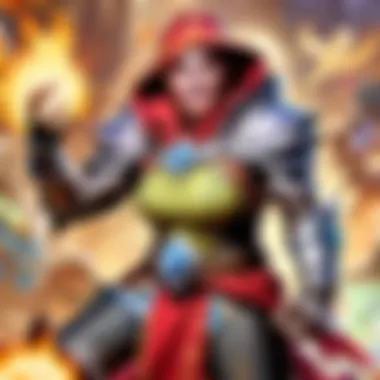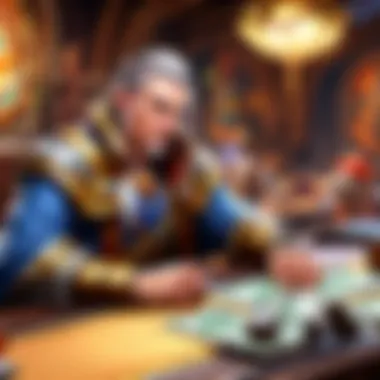Navigating the Intricate Economics of Magic: The Gathering Arena


Game Updates and Patches
Magic: The Gathering Arena, a sophisticated digital card game ecosystem, undergoes regular updates and patches to enhance the gaming experience. These updates introduce changes ranging from game mechanics adjustments to the introduction of new cards and strategies. Players eagerly anticipate these updates, which often shift the meta and redefine gameplay dynamics.
Deck Strategies and Meta Analysis
Delving into deck strategies and meta analysis in Magic: The Gathering Arena unveils a competitive landscape where players strategize to outwit opponents. From highlighting top deck recommendations tailored to diverse play styles and skill levels to dissecting the prevailing meta and popular deck archetypes, this section equips players with the knowledge to adapt and thrive in various gaming scenarios.
Card Reviews and Set Reviews
Exploring card reviews and set analyses in MTG Arena offers players essential insights into card synergies and set values. Every new card and set comes with the potential to reshape the game's dynamics, affecting the competitive environment significantly. Evaluating the competitive viability, versatility, and synergies of cards within different archetypes is paramount to mastering the intricate world of MTG Arena.
Player Guides and Tips
Amateur and seasoned players alike benefit from comprehensive player guides and tips tailored to enhance their gaming experience in MTG Arena. These guides range from beginner tutorials that elucidate core game mechanics and strategies to advanced tips aimed at honing gameplay skills and decision-making abilities. Additionally, invaluable insights into arena drafting strategies and gameplay nuances specific to the arena mode serve as essential tools for players looking to elevate their gameplay.
Introduction
In the intricate realm of Magic: The Gathering Arena lies a financial landscape as diverse as the planeswalkers themselves. Understanding the costs involved in this immersive digital card game is not merely about currency but a strategic economic dance where decisions shape your gameplay experience. This article embarks on a meticulous journey through the fiscal dimensions of MTG Arena, shedding light on entry fees, pack purchases, and the strategic maneuvers that can influence your financial standing within the game. By delving into the economics of MTG Arena, players can equip themselves with the knowledge needed to navigate this captivating realm of spells and strategy.
Overview of MTG Arena
Magic: The Gathering Arena stands as a digital platform that encapsulates the essence of the popular trading card game – Magic: The Gathering. Through digitized cards, dynamic gameplay, and vibrant visuals, MTG Arena offers players a bridge between the physical and virtual realms of card gaming. With a user-friendly interface and regular updates reflecting paper-based expansions, MTG Arena provides a versatile and engaging arena for players worldwide to showcase their deck-building prowess and strategic acumen.
Significance of Understanding Costs
A profound comprehension of the financial facets within MTG Arena is not merely an option for players; it is a strategic necessity. By grasping the intricate web of costs entwined within the game, players can optimize their resource management, make informed decisions regarding in-game purchases, and tailor their gameplay strategies to align with their financial goals. Understanding costs in MTG Arena is akin to deciphering the cryptic language of spells – it empowers players to wield their resources judiciously and enhance their overall gaming experience.
Initial Costs
The concept of initial costs within the realm of MTG Arena is a crucial point of discussion in this elaborate article. Understanding the significance of these costs is paramount for any player diving into the world of Magic: The Gathering Arena. The initial costs encompass various elements that lay the foundation for a player's journey, such as downloading the game, obtaining starter decks, and engaging in tutorial gameplay. These costs serve as the gateway to entry into the immersive universe of MTG Arena, providing players with the tools and knowledge necessary to navigate the gameplay intricacies.
Downloading the Game


Downloading the MTG Arena game marks the primary step towards embarking on the magical adventure it offers. This process is not just a technicality but an initiation into an enchanting world where strategic prowess meets card-based gameplay. Players must navigate through the digital landscape to access the game client, ensuring a seamless transition into the captivating universe of Magic: The Gathering Arena. The act of downloading the game sets the stage for forthcoming interactions, challenges, and victories, shaping the player's virtual journey in significant ways.
Starter Decks
Starter decks serve as the foundational card sets that kickstart a player's card collection and strategies within MTG Arena. These decks are not merely a random assortment of cards but curated selections designed to introduce players to fundamental gameplay mechanics and strategies. Acquiring and optimizing starter decks is pivotal for beginners, offering them a strategic advantage in the initial stages of gameplay. Understanding the composition and potential of starter decks is essential for players looking to establish a strong foothold in MTG Arena, setting the tone for future deck-building endeavors and tactical engagements.
Tutorial and Practice
Engaging with tutorials and practice sessions is a critical aspect of acclimating to the gameplay dynamics of MTG Arena. These resources not only familiarize players with the game's rules and interface but also hone their strategic thinking and decision-making skills. Tutorials offer a structured learning environment where players can grasp the fundamental concepts of gameplay, providing a solid foundation for navigating the complexities of Magic: The Gathering Arena. Practice sessions further enhance a player's proficiency, allowing them to test strategies, refine techniques, and prepare for competitive gameplay scenarios.
Acquiring Cards
Acquiring Cards plays a pivotal role in Magic: The Gathering Arena, serving as the foundation for deck building and strategic gameplay. The process of obtaining cards involves a mixture of purchasing packs, crafting specific cards, and exploring trading dynamics within the game's market. Making informed decisions when acquiring cards is crucial for players aiming to enhance their card collection, construct competitive decks, and delve deeper into the strategic intricacies of MTG Arena.
Purchasing Packs
Gold Packs
Gold Packs offer players a convenient way to access a variety of cards within MTG Arena. These packs can be obtained using in-game currency known as gold, providing flexibility for players looking to expand their collection without spending real money. One of the key advantages of Gold Packs is their accessibility, allowing both free-to-play and paying players to acquire new cards and resources to improve their gameplay experience. However, the randomized nature of card distribution in Gold Packs can sometimes lead to duplicates or less valuable cards, requiring players to engage in additional strategies like card crafting and trading to optimize their collection.
Gems Packs
Gems Packs represent a premium option for acquiring cards in MTG Arena, offering players the opportunity to purchase packs using real money. Gems serve as the in-game currency that can be bought with real-world currency, providing players with a shortcut to acquiring specific cards or desired resources. The primary appeal of Gems Packs lies in their guarantee of card quality and quantity, allowing players to bypass the randomness associated with Gold Packs and target specific cards they need for their decks. While Gems Packs offer a more direct route to acquiring desired cards, they require financial investment, making them a choice more suitable for players looking to expedite their card collection or focus on competitive gameplay.
Crafting Cards
Common Cards
Common Cards are an essential component of card crafting in MTG Arena, providing players with a cost-effective method to obtain cards that form the backbone of many decks. Crafting Common Cards requires players to 'disenchant' unwanted or duplicate cards in exchange for resources that can be used to create specific Common Cards they need. The affordability and versatility of Common Cards make them a popular choice for players seeking to fill gaps in their collection or experiment with new deck archetypes.
Rare Cards
Rare Cards represent a higher rarity tier in MTG Arena, offering unique abilities and strategic advantages to players who incorporate them into their decks. Crafting Rare Cards demands a greater investment of resources compared to Common Cards but rewards players with access to powerful cards capable of influencing game outcomes significantly. While crafting Rare Cards may require more patience and resource management, their impact on deck performance makes them a sought-after option for players aiming to enhance their gameplay strategies.


Mythic Rare Cards
Mythic Rare Cards stand at the pinnacle of rarity in MTG Arena, boasting unparalleled power levels and strategic significance in gameplay. Crafting Mythic Rare Cards necessitates substantial investment in resources, making them a prized possession for players looking to elevate their deck's potential to compete at the highest levels. The unique and potent abilities of Mythic Rare Cards make them aspirational targets for players seeking to optimize their deck composition and gain a competitive edge over opponents.
Trading and Market Dynamics
In MTG Arena, trading and market dynamics introduce a layer of complexity to card acquisition, allowing players to exchange cards with each other or engage in the buying and selling of cards through in-game mechanisms. Understanding the fluctuations in card values, market trends, and player demand is crucial for navigating the trading landscape effectively and securing valuable cards at optimal prices. By actively participating in trading and monitoring market dynamics, players can strategically expand their card collection, acquire coveted cards, and cultivate a deeper understanding of the economic nuances shaping the MTG Arena community.
Gameplay Costs
In the realm of MTG Arena, Gameplay Costs play a pivotal role in shaping the overall player experience. Understanding the financial implications of participating in various in-game events and tournaments is crucial for any player looking to navigate the economic landscape efficiently. These costs encompass a variety of aspects that directly influence how players engage with the game, affecting their strategies, deck-building decisions, and overall progression. By comprehensively examining Gameplay Costs, players can make informed choices that align with their objectives and optimize their resource utilization, ultimately enhancing their competitiveness and enjoyment of the MTG Arena ecosystem.
Events and Tournaments
Entry Fees
Entry Fees stand as a fundamental component of the Gameplay Costs within MTG Arena. These fees serve as the entry ticket for players to participate in different events and tournaments, ranging from casual play to competitive showdowns. The significance of Entry Fees lies in their role in not only regulating participation but also in contributing to the prize pools that incentivize engagement. By requiring players to invest a certain amount to enter events, MTG Arena ensures a balanced ecosystem where commitment and skill are valued, creating a compelling gameplay environment. While Entry Fees may pose initial financial hurdles for some players, they serve as a gatekeeper that maintains the integrity and competitiveness of MTG Arena's diverse event offerings.
Prize Structures
Prize Structures represent another critical facet of Gameplay Costs, dictating the potential rewards and returns for players based on their performance in events and tournaments. These structures outline the distribution of prizes, highlighting the incentives available to participants and the potential outcomes based on their standings. The allure of Prize Structures lies in their ability to motivate players to strive for excellence, offering tangible rewards for their dedication and prowess. However, the variance in Prize Structures also introduces an element of risk and uncertainty, requiring players to weigh the potential gains against the associated costs of participation. By understanding the intricacies of Prize Structures, players can formulate strategic approaches to maximize their returns while mitigating risks, fostering a balanced and rewarding gameplay experience.
Drafting and Sealed Events
Draft Fees
Draft Fees constitute a distinct element of Gameplay Costs, particularly prevalent in drafting events where players build decks on the fly. These fees encompass the cost of participating in draft events, granting players access to the drafting experience and the subsequent battles with their constructed decks. The appeal of Draft Fees lies in the dynamic and engaging nature of drafting, where creativity and adaptability are key to success. While Draft Fees represent a valuable investment in skill development and strategic depth, they also demand careful consideration of resource allocation to ensure optimal returns from the drafted decks. Navigating Draft Fees effectively requires a blend of foresight, deck-building expertise, and tactical acumen, enabling players to harness the full potential of the drafting format within MTG Arena.
Sealed Fees
Sealed Fees offer players an alternative avenue to engage with limited formats, where deck construction occurs with a sealed pool of cards. These fees cover the cost of participating in sealed events, providing players with a unique deck-building challenge and test of their card pool optimization skills. The allure of Sealed Fees lies in the crafting process and the strategic decisions involved in maximizing the potential of the provided card pool. While Sealed Fees may necessitate a different approach compared to drafting events, they offer players an opportunity to showcase their deck-building acumen and adaptability in diverse gameplay environments. By delving into Sealed Fees, players can explore new dimensions of gameplay, sharpen their deck-building prowess, and diversify their MTG Arena experience, embracing the distinct challenges and rewards presented by sealed formats.
Economic Strategies


In delving into the multifaceted realm of Magic: The Gathering Arena, Economic Strategies emerge as a pivotal linchpin in understanding the intricate web of financial dynamics governing the game. These strategies serve as the compass guiding players through the labyrinthine landscape of costs and resource management within MTG Arena, ushering them towards optimal decision-making and resource utilization. By honing in on Economic Strategies, players can navigate the economic terrain with acumen and foresight, ensuring a judicious allocation of resources to maximize their gameplay experience and cultivate a sustainable in-game financial ecosystem.
Optimizing Resources
Daily Quests
Daily Quests epitomize a cornerstone facet of Economic Strategies within MTG Arena, offering players a structured avenue to bolster their in-game coffers and advance their card collection. These quests proffer tailored objectives that incentivize players to engage with diverse aspects of the game, ranging from deck construction challenges to multiplayer showdowns. The crux of their allure rests in their dual functionality - not only do Daily Quests provide a steady influx of in-game currency or rewards, but they also foster a sense of achievement and progression, thereby enriching the player experience. Embracing Daily Quests as a fundamental component of in-game economic management not only augments resource accumulation but also imbues gameplay sessions with purpose and direction, underscoring their indispensable role in fortifying one's foothold within MTG Arena.
Weekly Wins
Across the economic landscape of MTG Arena, Weekly Wins emerge as a bastion of opportunity and advancement, beckoning players with the promise of lucrative rewards and milestones. Articulating a structured framework, Weekly Wins urge players to actively partake in gameplay and clinch victories to unlock bountiful incentives. Their intrinsic appeal lies in fostering a consistent cadence of engagement and progression within the game, spurring players to hone their skills, experiment with diverse strategies, and savor the fruits of their labor. Basking in the glow of accomplishment, players embarking on the journey of Weekly Wins not only accumulate substantial rewards but also cultivate a sense of camaraderie and fulfillment, weaving an enriching tapestry of experiences within the economic realm of MTG Arena.
Budgeting Tips
Investment Perspectives
Community Impact
Magic: The Gathering Arena stands as a melting pot of enthusiasts, where the impact of community transcends mere gameplay. The collaborative essence of community sheds light on the social fabric intertwining MTG Arena players worldwide. Celebrated for fostering camaraderie, exchanging strategies, and engaging in friendly banter, the community solidifies its presence as the game's cornerstone. This dynamic interplay not only enriches the gaming experience but also promotes a sense of belonging and shared passion among players journeying through the MTG universe.
Discussion Forums
Within MTG Arena's intricate ecosystem, discussion forums emerge as bustling hubs pulsating with intellectual discourse and strategic musings. Players congregate in these digital realms to dissect gameplay mechanics, unravel card synergies, and debate meta strategies with fervor and zeal. The forums serve as incubators for innovation, where seasoned veterans dispense wisdom and novices seek enlightenment. Furthermore, these forums act as repositories of knowledge, archiving pivotal discussions, which become gospel for players navigating the labyrinthine avenues of card interactions and deck construction.
Content Creation and Streaming
In the digital age, content creation and streaming redefine player engagement within the MTG Arena community. Influential content creators wield their expertise like arcane spells, captivating audiences with insightful gameplay analysis, deck tech breakdowns, and riveting live streams. By unraveling the game's intricacies in real-time, these adept creators bridge the gap between novices and experts, fostering a culture of continuous learning and skill enhancement. Moreover, the surge of user-generated content amplifies the game's reach, attracting new players and fostering a vibrant tapestry of diverse playstyles within the community.
Conclusion
The Significance of Conclusion in Understanding the MTG Arena Costs
In this conclusive section of the article, we reflect on the critical relevance of the conclusion in discerning the intricate economics of Magic: The Gathering Arena. The Conclusion serves as the culmination of all preceding discussions on the costs associated with playing MTG Arena. It encapsulates the key takeaways and essential insights revealed throughout the article, providing readers with a clear roadmap of the financial landscape within the gaming platform. By emphasizing the Conclusion, readers can grasp the holistic picture of the economic dimensions of MTG Arena, enabling them to make informed decisions and strategic choices regarding their gameplay and investment within the virtual realm. Furthermore, the Conclusion acts as a guiding light for navigating the complexities of in-game expenditures and financial planning, empowering players to optimize their resources effectively and enhance their gaming experience. Overall, the Conclusion plays a pivotal role in synthesizing the diverse elements explored in the article, consolidating the learnings and implications for both novice and seasoned MTG Arena enthusiasts.
Final Considerations
As we delve into the final considerations of MTG Arena's cost analysis, it is paramount to underscore the significance of prudent financial management in optimizing one's gaming experience. The Final Considerations section encapsulates the pivotal aspects that players must factor into their decision-making process, ranging from budget allocation to strategic resource management. It serves as a strategic guide for players seeking to maximize the value of their investments while minimizing unnecessary expenditures within the game. By exploring the Final Considerations, readers gain valuable insights into the nuanced strategies and techniques for navigating the economic terrain of MTG Arena with foresight and acumen. From customizing gameplay strategies to leveraging in-game events and promotions, the Final Considerations section equips players with the requisite knowledge to make informed choices that align with their overarching gameplay objectives.
Long-Term Financial Planning
In the realm of Magic: The Gathering Arena, long-term financial planning emerges as a cornerstone of sustainable gameplay and financial prudence. This section delves into the strategic foresight required to effectively manage one's in-game resources over an extended period. Long-Term Financial Planning offers readers a comprehensive roadmap for budgeting, investment allocation, and goal setting within the dynamic ecosystem of MTG Arena. By fostering a proactive approach to financial planning, players can navigate the volatility of in-game economies and capitalize on lucrative opportunities for growth and advancement. Furthermore, Long-Term Financial Planning underscores the importance of cultivating a diversified gaming portfolio and adapting to evolving market dynamics within MTG Arena. Encompassing insights on risk management, asset allocation, and long-term wealth accumulation, this section equips players with the tools to architect a resilient financial foundation for sustained success and enrichment within the virtual realm.







